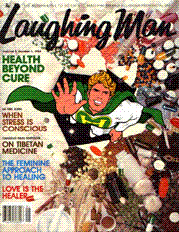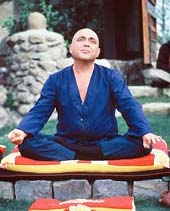
The Laughing Man Magazine, Vol 5. NO 1, 1984

***
Adi Da Samraj: Diet is not the key to anything sublime. Diet is just food. It is vital, physical activity. You cannot become absolutely healthy simply by manipulating the diet, because diet only deals with the body. It does not deal with anything higher than the body in the range of functions. It does not deal with the subtler levels of consciousness, the psychic being or the higher mental being. Much of what is happiness and unhappiness is rooted in these so-called higher functions. Thus, not everything symptomatic in the vital, physical life can be cured by the manipulation of vital-physical quantities such as food.
Therefore, you must not seek the perfect diet in order to be perfectly cured. There is an appropriate use of food, but apart from that, diet does not deserve any attention whatsoever. You must be engaged in devotional practice at every level of life. You must discover what is appropriate at each of these levels and adapt to it simply, routinely, and happily, without looking for solutions. If you live in devotional Communion with God, then you do not need solutions!
Nevertheless, it does happen that when a person who has been on a degenerative diet adapts to a healthful diet, he discovers that his entire functional mind is changed. All the mechanisms that feed the brain, that bring blood to the brain and transfer nerve energy, are purified, intensified, and rejuvenated through fasting and right diet. Naturally this phenomenon has an effect on the functional ability to use the mind in life, the ability to think, to form concepts, to remember, to recall. All these functions are modified by purifying the physical life. In general, fasting and right diet certainly do tend to harmonize and to clarify the psychophysical life. But they do not transform the life absolutely. If you simply applied yourself to physical laws, you would not completely transform or harmonize the psycho-physical life. That transformation depends upon the devotional and spiritual practice and the Divine Grace that is activated in the Presence of the living Spiritual Master.
In general, food is necessary to varying degrees, depending upon a person’s present state of life, how he tends to live, what his karmas1 are, what he must live as his condition entirely independent of what he does or does not do. The usual man, because he is in conflict with himself and is always destroying the integrity of his functional life, depends upon things outside himself to restore him. Therefore, he becomes very dependent on sleep and on food and other substances he can take into his body. He becomes very dependent upon experiences from without, on promises from without, on sources of energy communicated from without.
Observing that dependence in yourself, however, does not necessarily mean that the opposite ideal is appropriate, a condition wherein you no longer eat, no longer sleep, no longer deal with anything apparently outside your own functional personal presence in the world. Nearly everyone falls between these two extremes of dependence and independence, and the play of your own dependence and independence is something that you must inspect and for which you must become responsible. The rhythm of dependence and independence will change over time; it will even be different on a given day. Thus, the pattern of sleep will change according to your present state of health, just as the sum of your intensity will increase or vary over time, and the need for food and the w hole effect of food on your life will vary over time.
It is true, however, that if a person’s general state of health is good and if he keeps active, exercises properly, and uses this diet, he will need far less food, because the substances that he uses are alive and provide the chemical elements that affect the vital, physical system far more positively than all the mass of junk food that everybody else takes. Such a person may also discover that he has less need for sleep at night.
There are people who survive entirely without ordinary food. If you observe your own system carefully and treat it with intelligence and present consciousness, you may discover one day an entirely new quality of internal energy and you will not need to eat anymore. But on that day you will not feel as if you had attained a goal you had sought all your life. That is just the way it will be, just as yesterday you awoke and needed breakfast.
Questions like, “Do we need food to survive? Do we need sleep to survive?” have a certain experimental interest, but they are not fundamentally important from my point of view. It is the relationship of these natural cycles to Consciousness that is significant. And it is in relation to conscious life that all the personal disciplines such as diet have been given to devotees, not fundamentally in relation to physical life in itself, or the need for survival. As a by-product of the appropriate management of diet, health and well-being improve. And these effects are certainly positive. The fundamental intention, however, is to produce an optimal condition for a conscious devotional life of sacrifice to God.
Nevertheless, devotees in the Way of Radical Understanding or Divine Ignorance, just as people anywhere else in the world, tend to take on the point of view of “lunchrighteousness.” Right away all kinds of goals for diet and physical life become very fascinating. For a period of several months when I first spoke about this vegetarian diet and we began to use it every day, practically every time a devotee came to me, I was asked some questions about diet. All anybody wanted to talk about was diet. The questions were endless! People had become obsessed with it—yet it is only lunch!
The diet is really very simple, but as soon as some formal approach to a basic function in life is suggested, people begin to establish goals for the process. Among devotees at that time, everything about food and its use became fascinating. Suddenly everyone began to seek perfect health, longevity, immortality, and the Divine body—through food. Yet there is no lunch, and there never has been a lunch, and there never will be a lunch that can produce the Divine body, or immortality, even extreme longevity or perfect health. There are a few basic principles relative to diet, and they are what they are. But the diet in itself is not responsible for one’s very existence or one’s continued existence. There is a much larger Circumstance than diet that is responsible for our continued bodily existence, just as there is a greater Circumstance responsible for our present bodily existence, and even our very birth.
If there were a perfect goal that I could discover somehow and that seemed appropriate to me, I would organize a system that would include every possible factor in life, because a perfect goal implies everything, and everything must be made to conform to it in one way or another. But there is no such goal. Our fetishistic preoccupation with goals is nonsense. All of it is essentially the product of suffering. Goals appeal to us because of our sense of dilemma, because we are already suffering. They appeal to our sense of suffering, and only beet use of our present sense of suffering are we interested in attaining any goal at all.
In my early work with devotees, before I determined that it was time for them to strictly observe this discipline and others, people used to argue with me about vegetarian diet and about this and that diet. And I always did the opposite. I always argued against their persuasion. I smoked a cigarette in front of them, drank coffee deliberately, and talked about the whole strategy, the whole motivation, the whole false view of spirituality that was their reason for being vegetarian. I was not arguing against the vegetarian diet in itself, but against the strategic program connected with it. I have always spoken to the program that is your search, quite apart from what you eat and whether or not you are a vegetarian.
Just as you must be free of self-indulgence and all its goals, you must be equally free of the cult of discipline, the form of righteousness that appears whenever you fulfill a discipline. Feeling self-conscious and modest while drinking a little mint tea with friends who are drinking coffee is so small, so narrow and tacky. It is the product of that motivated cult of discipline in which there is no freedom, no fundamental humor, no real comprehension of the importance of daily events—just foolish concerns for purity of diet when people are murdering one another with every movement of their minds. All that obsessive concern for diet is inappropriate. What is appropriate is just a natural, functional awareness of what you eat.
All religious and spiritual groups have some sort of cult of diet attached to them, and the more orthodox they are, the more foolish, resistive, and alienated from the rest of the world they become. So I do not expect devotees to indulge themselves at all in the vulgar diet by which people in general are destroying themselves, but I expect them to have a humorous relationship to the world, to be present in the world without calling attention to their preferences. In the midst of our fundamentally free use of diet, there are no grounds for righteousness or guilt or preoccupations. Work out your diet intelligently.
I want the individual to realize his dietary practice from the point of view of his own intelligence, his own experience, as long as – he does not drift into the principle of his desires. My interest is always to deal with the fundamental condition, the fundamental self-limiting activity of every human being. And that activity appears whether you are drinking mint tea or a glass of wine. The same self-obsessed one sits behind it. The more I have had to be involved with all the petty and secondary details of life, the less opportunity I have had to deal with you in this fundamental way. So I expect you to deal intelligently with your own functional life.
There is a traditional saying: “Work out your own salvation!” But diet has nothing whatever to do with the acquisition of salvation, as you should know by now! It is simply an ordinary discipline for intelligent people who are devoted to always present Love-Communion with the Living God.
1. The Sanskrit word karma, which has entered the English vocabulary during the past decade, means literally “action.” It signifies the retributional force hidden in every action by which Man reaps as he sows. It denotes the law of moral causation that chains Man to the cycle of repeated incarnation in the material world or in supraphysical realms that spell, without exception, un-Enlightenment and suffering for him. Only the Enlightened being transcends the universal law of karma and hence also the suffering in all the countless worlds or dimensions of manifest existence.